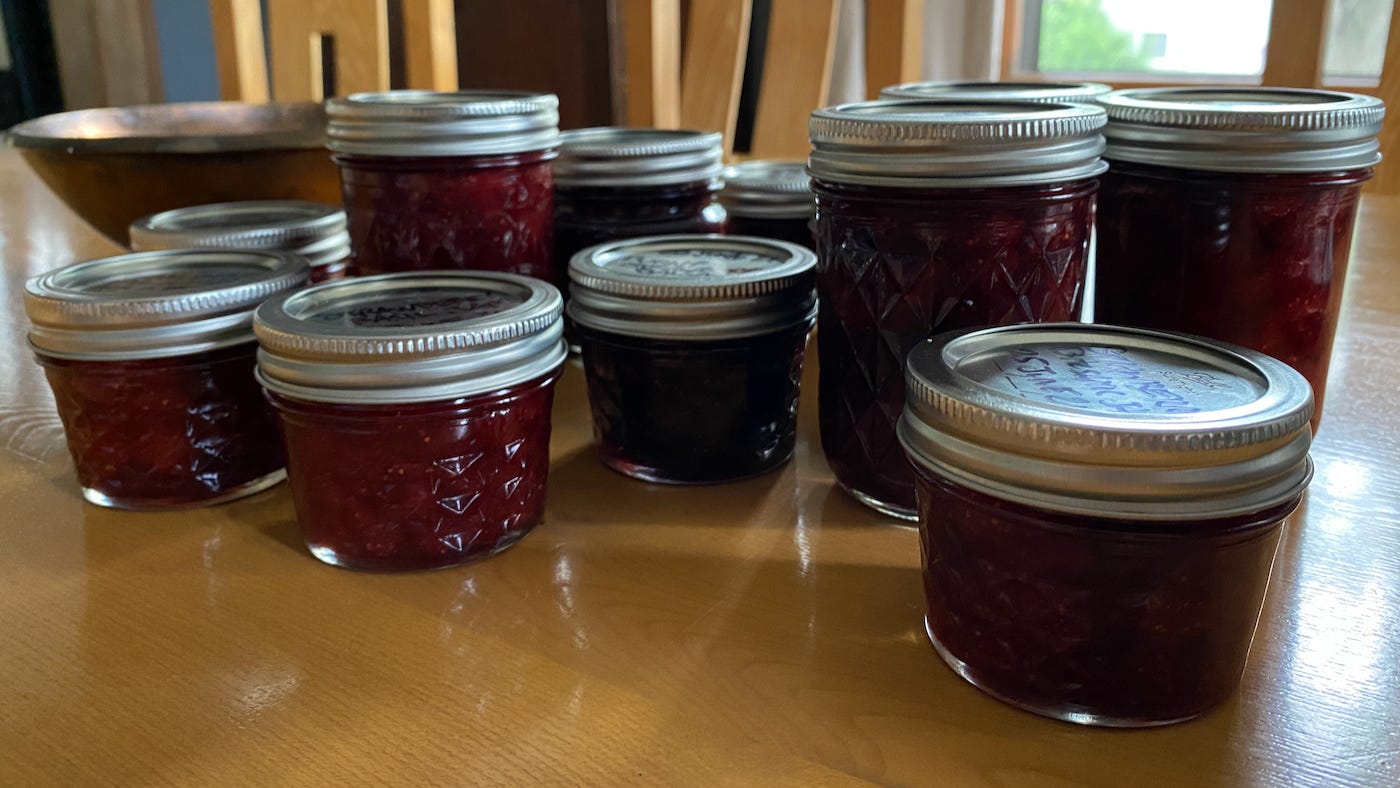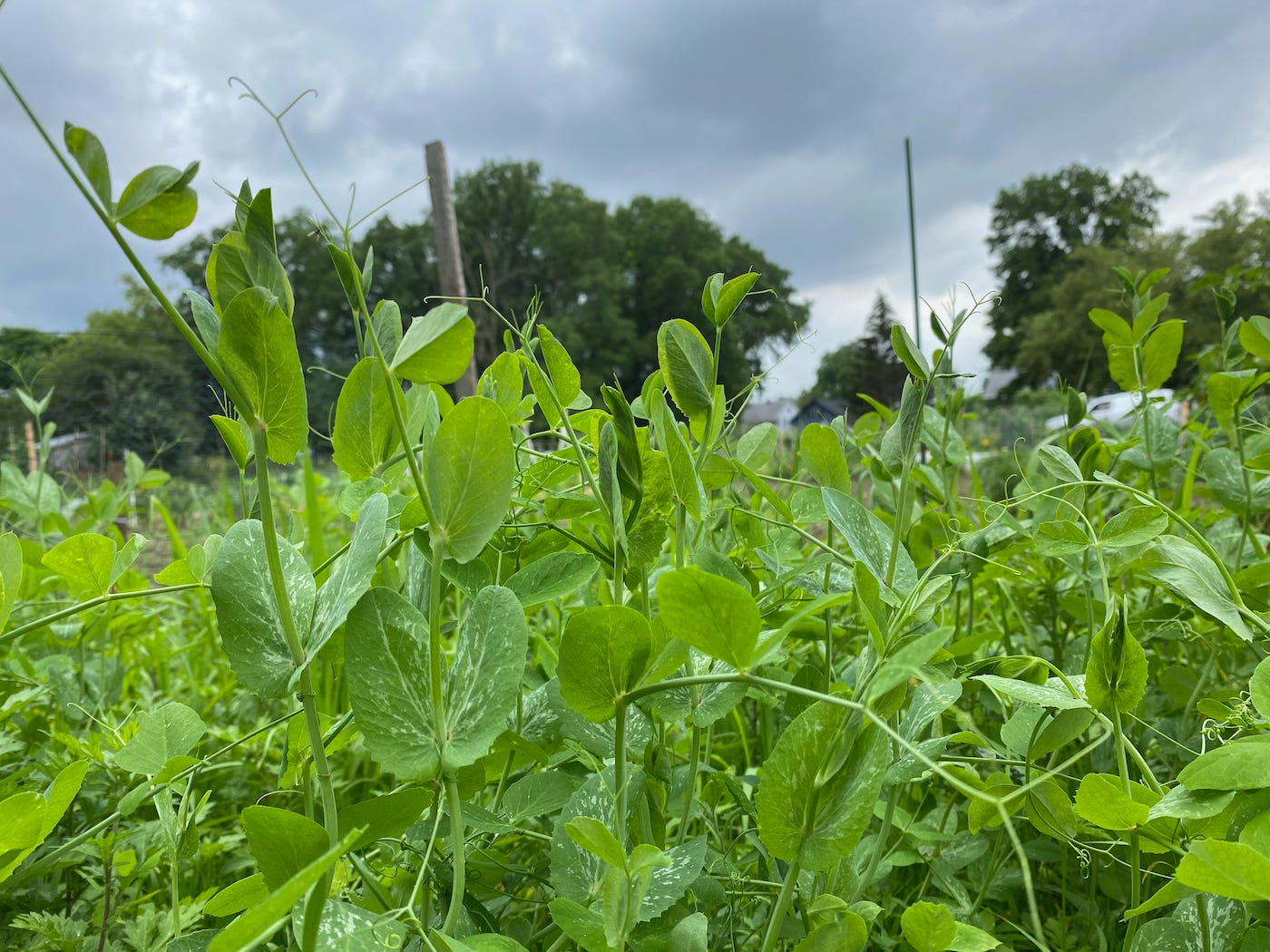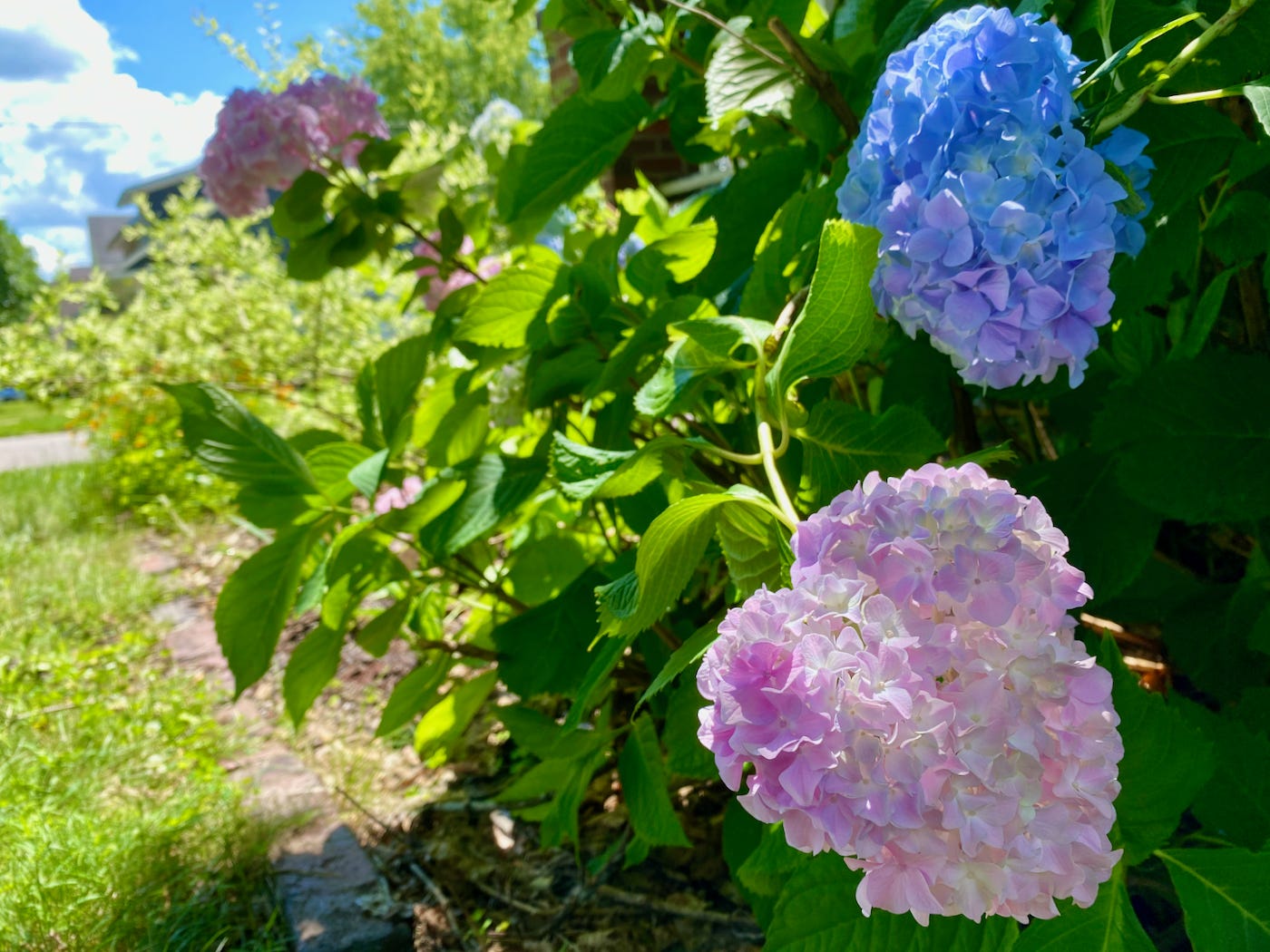Pride and Prejudice
Some fragmented thoughts on Pride Month, strawberry jam, field peas, and a sung blessing
Thursday, July 1
Grand Rapids, Michigan
Hello, dear reader.
Pride Month is officially over. Yet here I still am, just as gay as I was yesterday.
Pride has always been a weird thing for me. In my early twenties, before I came out, I wandered central London alone after one year’s Pride parade had just ended. Glitter and streamers littered the streets. Queer couples strolled hand in hand. Crowds thronged Old Compton Street, packing the gay bars, including the Admiral Duncan, where, just a few years before, three patrons had been killed in a nail-bomb attack.
I wasn’t out yet then. I still remember the strange mix of self-loathing and profound longing that coursed through me. Everywhere, groups of friends were laughing, drinking, dancing. They looked so free. What might that be like? They seemed so brave. How might that feel?
I left Soho and walked up Regent Street to the church I attended at the time, a conservative Anglican parish called All Souls Langham Place. Its tall spire and elegant columns preside over Regent Street’s north end, and I sat on the stone steps of the church, trying to borrow some of their steadiness. The famed pastor and evangelist John Stott was then the rector emeritus. I’d admired his preaching. I’d tried to live into his call to “the liberty of obedience.” “Sexual sins are not the only sins, nor even necessarily the most sinful,” Stott once wrote. “Pride and hypocrisy are surely worse.”
The word “pride” is not one that the Bible typically uses in favorable terms. “Pride goes before destruction,” Proverbs 16 says. And Isaiah 2 declares that “the pride of everyone shall be brought low.” Such verses ricocheted against my weary heart, and I couldn’t make sense of them.
As I sat on the church steps, the story I told myself was that I didn’t really want to be proud anyway; I wanted to be right and good. I really did believe that pride—or at least Pride—would come before my destruction. If I were honest about my sexuality, I feared I would lose my family and my friends. Worse yet, I’d lose my place in the church—and I’d lose the love of God.
My perspective on Pride only changed a few years later, after I’d come out, after I’d stopped lying about my sexuality. I still don’t get the stereotypical gay obsession with glitter; we prefer matte colors to shiny in our household, and glitter just gets everywhere, stubbornly reasserting its presence like a houseguest that stays on for too long. But I did began to differentiate between an outsized sense of self—the kind of haughtiness and arrogance indicted by the Bible’s references to “pride”—and a right, good, and honest one. And I started to understand how these marches, these parades, these special commemorations are inspired not so much by a desire to be proud in the Biblical sense than by a yearning just to be seen, to be acknowledged, to be valued, to be viewed as equal, and to be loved.
Pride began in protest. It asserted the right of trans and queer people to exist and to flourish. With their bodies, the early protesters claimed equal belonging in society, often at terrible cost. That I can even write these words to you is in large part a credit to them. And for anyone who saw a rainbow flag and felt just a little bit bolder to be honest, for anyone who read a word of solidarity and found a little more resolve to be who God made them to be, for anyone who heard a message of hope and felt a little more courage, Pride Month has been and will continue to be worthwhile.
From the start, the word “pride” served as a riposte to marginalization and oppression, and it still offers a necessary rebuke to the shame still actively imposed by so much of our society. Honestly, I’d much prefer ”humility.“ I know that just shows I’m a terrible marketer: Who would show up for a Humility March? To be clear, I’m writing from a particular theological standpoint that many people don’t share. Though humility has often been misunderstood as modesty verging on falsehood, it actually calls us to be grounded in truth, rooted in reality, and anchored in love—above all God’s love. Humility is radiant and unashamed, drawing its light from divine goodness. Humility compels listening and learning. Humility urges us toward compassion, respect, and equity. Humility enables us to rejoice with those who rejoice and mourn with those who mourn—and it encourages us to help foster joy and forestall sorrow.
Anyway, I digress. One of my ongoing struggles with Pride Month is that I want our stories and our experiences and indeed our lives to matter whether it’s June or September or December or April, because I believe our stories and our experiences and indeed our lives are worthy of mattering whether it’s June or September or December or April. I care less about rainbow frames around your Facebook profile picture than I do about the ways in which you come alongside those you care about because of every aspect of their humanity, not just one. (It wasn’t lost on me that so many folks who rushed to rainbow-frame themselves on June 1 had been utterly silent about AAPI Heritage Month, which was in May.) Recently, I saw a post on Facebook from a straight person who was asking for advice for how to show solidarity with and care for a teenager who had just come out in a deeply conservative context: Should she wear a rainbow pin? An ally T-shirt? I don’t have a problem with either of those things, but the better option seemed obvious to me: Just be a friend, whatever the season, whatever the month. Just love them like you’d want to be loved.
Such friendship, such love, matters because, especially for many of us who grew up in the church, coming out and living with faithful integrity remain costly. We might lose friends. Our relationships with family can fray. We are regarded differently than, say, a straight couple with 2.5 kids. It was only last year that the Supreme Court ruled that the Civil Rights Act of 1964 covered sexual orientation and gender identity, yet that still doesn’t cover LGBTQ+ people who work in small businesses; they can still be fired for who they are. And it doesn’t apply to religious institutions; earlier this week, I learned that, because of my sexuality and my marriage, my denomination had postponed the vote on my ordination yet again. (Here’s what I wrote about that process in the New York Times last year—and no, I am still not looking for a new denomination.)
Whatever your story, whatever your identities, today is as good a day as any to remind another person in your life that you care. Just because it’s July 1, not June 30, doesn’t mean that your words of encouragement are any less valuable or any less needed. Someone in your life needs to be reminded of your love today, just as they needed it yesterday. So send them a text message. Order them a meal. Drop a postcard in the mail. Ask how they’re doing—and listen well. Let your love radiate out into the world and into the life of one person who matters to you—and who might just benefit from hearing that they matter.
What I’m Cooking: We picked about 25 pounds of strawberries before the grievously short season ended. We had strawberries with pound cake, strawberries with our morning yogurt and granola, strawberry pancakes... and last weekend, I finished making jam. I posted a photo in my Instagram Stories with a simple, straightforward caption: “My jam.” To which my friend Nate replied, “Your dad joke game is on point.” Excuse me. As I told him: It was a statement of fact. What you choose to read into it is not my responsibility. I always make my jam in small batches (4 c berries to 1.25 c sugar, because we don’t like ours particularly sweet), and this year, we ended up with three different kinds: strawberry balsamic, strawberry balsamic with black pepper, and strawberry with basil.
What I’m Growing: I finally downloaded an app because I got tired of not knowing what was popping up in my garden plots. “That looks pretty!” I said. Common ragweed, the app replied. “That’s an interesting leaf,” I thought. Velvetleaf, the app reported. A noxious, invasive weed... It can secrete chemical substances that inhibit the germination and growth of other plants, resulting in crop yield losses. What do I know? Not a lot, it turns out. But I do have a bunch of welcome volunteers: a sunflower that seems to be flourishing, nowhere near where I planted sunflowers; red amaranth; plenty of ground cherries, which I’m hoping will bear enough fruit for a batch of preserves.
On the south side of one of my plots, I’ve planted millet and, in the southwest corner of the other, field peas. It troubles me that, as far as I know, the land in the community garden is never allowed to rest. So the millet and the peas are meant to be turned to green manure, enriching the soil.
Even though the peas are intended mainly as cover crop and green manure, pea greens are one of my favorite vegetables. They’re a delicacy in Chinese cuisine—one of the most expensive vegetables at the Chinese grocery, because of how delicate they are as well as because they’re so labor-intensive to harvest. If you’re growing peas, try sautéing some of the tender, young leaves with garlic and salt; they do cook down like spinach, so you’ll need more than you might think. But they’re delicious.
While I was picking pea leaves the other day—sometimes I say “artisanally harvesting,” mainly because I’m so slow—I was thinking about the ways in which we often see a thing as flat and one-dimensional. It does what it does, and it’s hard to see that it might have other value. Yet so often, that’s simply a failure of the imagination, a lack of understanding, and a persistence of injustice. It’s not the truth.
Recently, I’ve been wrestling with some dynamics in the world of writing that have been painful to confront, patterns of bias and justification and rationalization that are bound up with our idolatry of celebrity and that are, frankly, racist. The publishing industry—even, perhaps especially, the “Christian” part of it—is ridden with prejudice. Some days, I have the energy to say, “Wait, there’s another way to view this! See the pea plant for all the different and beautiful things it can do! Just because the label says ‘cover crop’ doesn’t mean there aren’t other ways to cherish and value this.” Other days, I feel beaten down. I’m tired of educating. I see the limits of gentleness, even as I try to convince myself that’s the best way I know to make myself heard.
On those other days, I just want to sauté the beautiful pea greens with lots of garlic, season them with plenty of salt and my angry tears, and eat them all. But I also try to remind myself that we cook so others can delight in something they might never have tried before and we write so that others can read a different story.
In other news, the hydrangeas in our front yard are looking great.
What I’m Listening to: The choral composer John Rutter is sometimes derided for writing cheesy church music. But honestly, sometimes the soul just needs some cheese. Maybe Spotify knew that about me this week. I was working on something or other—and by “working,” I mean getting sucked into some Internet vortex—when this version of Rutter’s “Gaelic Blessing,” sung by the English boys’ choir Libera, began playing. I needed it. I offer it to you if you need such a blessing today.
Deep peace of the running wave to you.
Deep peace of the flowing air to you.
Deep peace of the quiet earth to you.
Deep peace of the shining stars to you.
Deep peace of the gentle night to you.
Moon and stars pour their healing light on you.
Deep peace of Christ, the light of the world, to you.
Deep peace of Christ to you.
Just like last year, I’d like to share some of our jam. Leave a comment below—tell me what you’ve been cooking or growing, or share a reflection on something this newsletter stirred up in you. I’ll have Tristan randomly pick two names next week, and we’ll send each of those folks a jar of jam.
I’m so grateful we can stumble through all this together, and I’ll try to write again soon.
Yours,
Jeff





About 20 years ago I was working in a school with a very brusque custodian who I had very little in common with, but we often found ourselves taking lunch at the same time and would chat. He liked gardening and I told him one day about the family who hosted me on a high school exchange to Germany and their tremendous garden, where I had tasted red and black currants for the first time. A few days later he came in and shoved a branch at me without a word - it so happened that he had currants in his own garden and made a cutting from his red currant bush for me. I brought it home to my parents' house and my dad planted it in his garden, and for years it produced a small handful of berries, just enough to wash and eat one at a time standing over the sink.
This year, though! I moved home over the pandemic so I was here to harvested a bumper crop last week - two cups! Just enough to mix into a coffee cake, so that's what I did. Half of it is wrapped up in the freezer for a rainy (or more likely, wintery) day. And the other half we ate with big mugs of tea. Dad asked if the currants taste the way I remember them tasting. And they do.
Reading about your strawberry jam makes me think about the apricot and raspberry jams my grandparents used to make in the summers. Canning is something I would love to learn someday. These days I've been getting into salads because I can't bear to turn on the oven or use the stove much. I really like making a tuna salad with hummus instead of mayo. I like to add chopped celery, green onions, and a brightly colored bell pepper. Some lemon juice, ground cumin and coriander, and salt and pepper to taste round it out. Great to eat with corn chips or on toasted sourdough!